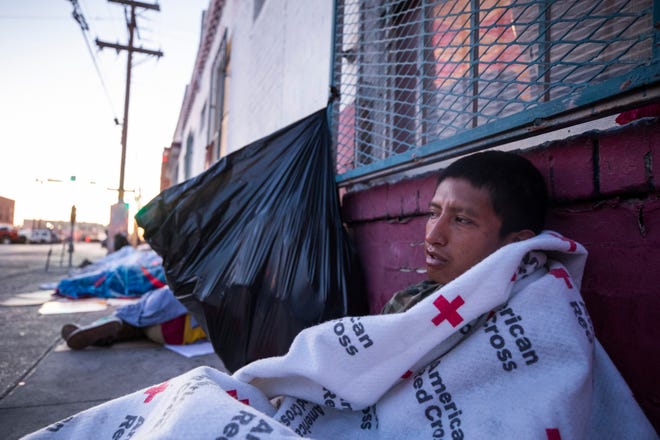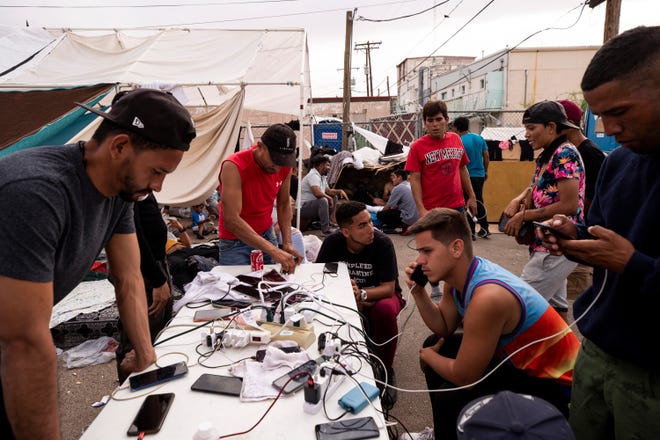Catch in federal funding leaves border cities unable to house or feed undocumented migrants
The funding stream created in 2019, was intended for solely for migrants processed by U.S. Customs and Border Protection.

EL PASO, Texas — When Joe Biden toured the border in January, John Martin shook the president's hand at a migrant shelter and leaned in with a special request.
Aid organizations in border communities, like Martin's Opportunity Center for the Homeless, were working to feed and shelter thousands of migrants during the 2022 winter humanitarian crisis. But they faced a dilemma: The federal government would only reimburse them for helping migrants with the right documents, even as the mix of migrants arriving was increasingly undocumented.
Martin asked Biden: “Can an exception be made for border communities?"
So far, the answer is no. Government and nonprofit organizations at the U.S.-Mexico border say the federal government has tied their hands with a funding stream that only reimburses them for aiding documented migrants.
At the height of the humanitarian crisis Monday, more than 3,300 unprocessed migrants were left in squalor on El Paso streets even while there were beds available in shelters. That number of unhoused people creates a powder keg of problems amid the desperation, local leaders say: trash and excrement, the potential for migrants to be targeted for prostitution and a trapped population for human smugglers.

“This is a national issue that needs to be addressed,” said Martin, deputy director of the Opportunity Center, which provides shelter to homeless locals and migrants who were arriving at the border without money for food, shelter or a ticket to their final destination.
“We are on the front doorstep, and it’s not just El Paso: It’s every community along the southern border,” he said. “The city and county and NGOs are all working together. It’s a very good response system to the need, but now we’ve got the federal laws working against us.”
More:Border Security Expo draws Homeland Security top brass as El Paso faces migration crisis
Federal funding with strings attached
The federal government is spending hundreds of millions of dollars to help communities along the border — as well as major destinations like New York City — care for migrants and prevent overcrowding of short-term federal holding facilities.
Since the funding stream was created in 2019, it was intended for migrants who had been processed by U.S. Customs and Border Protection. It was not supposed to cover food and shelter for migrants who entered illegally and have not sought asylum.
But an internal government watchdog said last year the Federal Emergency Management Agency needed better oversight of its Emergency Food and Shelter Program, which provides grants both for migrant services and to help a wider population.

“This was always a requirement, but it wasn’t one that was clearly communicated in the past,” said Aaron Reichlin-Melnick, policy director at the American Immigration Council.
Groups on the front line of the humanitarian crisis say that means people will go hungry and will be sleeping on sidewalks.
As the bells at El Paso’s historic Sacred Heart Catholic Church tolled for Mass on Sunday last week, migrants picked up their cardboard beds and blankets. City workers swooped in with brooms and garbage bags, and police guarded the entrance for churchgoers. A dozen or so of the migrants found seats in the hardwood pews among the local faithful.
“People are eating only once a day,” said Father Daniel Mora, explaining the limitations nonprofits and faith-based organizations are facing in providing aid to migrants.
“FEMA is only going to reimburse for people who are documented,” Mora said. “Many of the people around here — they’ll tell you so — crossed without permission. Those meals aren’t reimbursed.”
'Immoral not to feed people'
While FEMA has been providing grants from its Emergency Food and Shelter program for 40 years, Congress in 2019 created a separate track of the program to provide services for migrants encountered by the Department of Homeland Security at the southern border.
Homeland Security Secretary Alejandro Mayorkas said the restriction tying that funding to migrants processed by DHS “is necessary" and appeared to suggest NGOs should tackle the problem on their own.
“I believe that nongovernmental organizations in the cities address the needs of individuals who have not been processed,” he said.

El Paso’s primary food bank, the nonprofit El Pasoans Fighting Hunger, has struggled to keep people fed as one humanitarian crisis gives way to another.
The organization supplied 3,000 sack lunches every day last week for migrants living in shelters and on the street, said Chief Executive Susan Goodell.
“We believe that it would be immoral not to feed people, regardless of their status,” she said.
“But when people are that distressed,” she said, “our truck is often completely surrounded with people trying to ensure they have a meal for themselves and their children. It would not be safe to ask if they have an ‘A’ number or not.”
Border policies create 'man-made emergency'
Some in Congress have said the government shouldn’t be spending any FEMA money on migrant services.
“This is a man-made emergency,” Rep. Andy Harris, R-Md., told the head of FEMA during an April budget hearing for the agency. “I think it wanders way off what people expect FEMA to do.”
Dr. Francisco Garcia, the chief medical officer for Pima County, Arizona, told lawmakers at a different April hearing the question he’s most often asked is why the border county is helping local charities house, feed, medically screen and transport migrants.
“Having thousands of people with limited resources, limited English skills, trying to figure out how to get to other parts of the country that is unfamiliar to them, with no food, little money, no place to sleep, is deleterious to the health, safety and welfare of everybody in this country,” Garcia said.
“We are obligated to protect the people of Pima County by assisting these asylum seekers to quickly and efficiently move on to their final destinations and their sponsoring organizations or families,” he said.
The federal funding needs to be more stable and timely.
Rep. Ruben Gallego, D-Ariz., told FEMA Administrator Deanne Criswell in a recent letter that the program’s restrictions — including a 90-day limit on some services — may be hindering the ability of local leaders to deal with spikes in the arrival of migrants.
The program is transitioning into a new grant vehicle, the Shelter and Services Program, to help with humanitarian needs of migrants released from DHS custody who are waiting for their cases to be heard by an immigration court.
“That will prove, I think, more nimble,’ Mayorkas said Thursday.
Goodell, the food bank director, said her organization relies on charity even as it takes on increasing responsibility to prevent a humanitarian disaster at the border.
"We have to rely on the kindness of others in forms of charitable contributions," she said. "But now there is no government support, which makes it difficult when the numbers are so high."
Lauren Villagran reported from El Paso, Texas.
Maureen Groppe reported from Washington.
No comments: